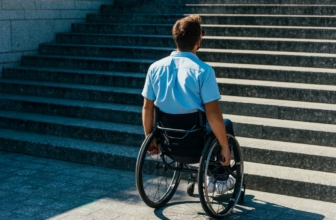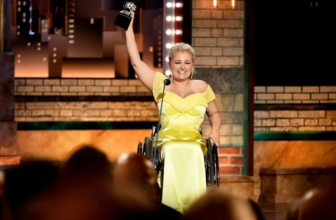I am familiar with the physical and mental challenges of living with a disability as I was born with cerebral palsy, spastic diplegia. Due to spastic and contracting conditions on the left side of my body, I must use a wheelchair to get around. In addition to the physical demands of managing a condition like cerebral palsy, adults with disabilities also have to navigate the complex world of doctors' appointments, insurance companies, and the daily responsibilities that come with being an adult. When you are constantly juggling, it is easy to burn out and become exhausted. It feels like juggling balls at the circus when you're constantly on a tricycle. That's how I would describe my life, but I wouldn't trade it for anything.
People with physical disabilities must prioritize self-care as a means of preventing disability burnout. Self-care is not a luxury; it is a necessity for maintaining overall well-being and managing the demands of life with a disability. Here are five ways to prevent disability burnout:
1. Take a Self-Care Day
One of the most common reasons for disability burnout is a failure to prioritize self-care. Being an adult with cerebral palsy, or any disability, is not only physically exhausting but also mentally demanding. We often have numerous issues on our plates, such as doctor appointments, insurance paperwork, and the demands of everyday life.
To prevent disability burnout, schedule a self-care day for yourself. This day should be dedicated to taking care of your needs without any external obligations. Whether it's binge-watching your favorite TV show, ordering takeout, or simply enjoying a nice frozen lemonade, taking the time to relax and recharge is essential.
I set aside a time every Friday night when I turn everything off and watch my favorite 1960s, 70s, and 80s shows such as MacGyver, ALF, The Doris Day Show, The Dukes of Hazard, and more. I take the time to simply enjoy the little things that make me happy, and feel refreshed afterwards.
2. Listen to Your Body
Your body tells you when to rest and recover. It is imperative to pay attention to your body's signals and heed its requests for a break. If you experience physical or emotional fatigue, take the necessary steps to recharge. For example, on my left side, my muscles tighten up when I'm doing multiple tasks and I get a headache. I know that that's my time to stop and do one of the things that help me prevent disability burnout and also helps my body relax when I listen to one of my favorite Christian bass bands I can only imagine and Rich Mullets Casting Crows Jeremy Camp, Willie Nelson, Blake Shelton, and Toby Keith, Reba McEntire, and Tasha Yearwood, and last but not least Garth Brooks.
Whether it's taking a nap, going for a gentle walk, or simply relaxing with a good book, giving your body what it needs will help you prevent disability burnout. Remember, self-care is not selfish; it is essential to your health and well-being. Because there's only one of you and you have to take care of yourself regardless of how weak your body may feel.
3. Be Mindful of Your Surroundings
The environment around you can significantly affect your mental well-being and stress levels. It is crucial to be mindful of those around you and avoid toxic relationships or environments that may contribute to disability burnout.
Get involved in activities that bring you joy and foster a sense of community, and surround yourself with positive influences and individuals who uplift and support you. It is possible to significantly reduce the risk of developing disability burnout by surrounding yourself with positivity.
When we are around people, or when we have someone in our lives that stresses us out negatively, our self-care is negatively affected. Because a very close friend of mine was negatively contributing to my mental health and self-care, I had to cut her out. I don't regret it because I am 10 times better now.
4. Take It Day by Day
When living with a disability, it's easy to get overwhelmed by the constant demands of managing a condition. To prevent disability burnout, take things one day at a time. Because if you don't take a day by day and you don't give yourself time to reflect it's gonna stress you out 10 times more and you don't need that on anyone. Every day brings you new chances for success, so embrace the progress you have made with pride.
Don't put unnecessary pressure on yourself or compare your progress to others. Celebrate the small victories, learn from your mistakes, and keep moving forward. Remember that progress takes time, and it's OK to take it at your own pace.
5. Remember, You Don't Need to Rush
Living with a disability can sometimes feel like a constant race against the clock. However, it's important to remember that you don't need to rush. Take the time to enjoy your life and savor the moments that make it worthwhile.
The best way to prevent disability burnout and maintain a positive outlook on life is to take it day by day and enjoy the moments. Don't compare yourself to others or judge your worth by external expectations. Take pride in your uniqueness, recognize your strengths, and celebrate your progress. Because the turtle did not rush, it always won the race, not the hare. The turtle always took pride in being the turtle whenever the hare wanted a shortcut. Be proud of being the turtle in life, as you can't be the hare.
Disabled people must prioritize their well-being and understand the importance of self-care to prevent disability burnout. You can significantly reduce your risk of burnout by scheduling self-care days, listening to your body, being aware of your surroundings, taking it daily, and remembering that you don't need to rush. For people living with disabilities, self-care is not a luxury; it is a necessity.
Tylia L. Flores is a twenty-eight-year-old born with Spastic Cerebral Palsy. Despite her condition that affects her mobility, she does not allow it to affect her will and determination to make a difference in the world. Through her many life challenges and obstacles, she discovered her passion for writing. Tylia’s goal in life is to share her stories with the world. In doing so, she hopes to help others with disabilities realize that they, too, have the potential to make their dreams come true. Tylia is not only an Amazon bestselling author. She’s a radio show personality and a disability activist.









Start the discussion at community.theabilitytoolbox.com